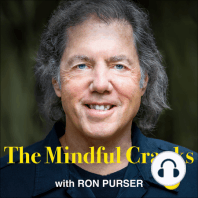14 min listen

Episode 34 - Gregory Kramer: A Whole-Life Path
Episode 34 - Gregory Kramer: A Whole-Life Path
ratings:
Length:
78 minutes
Released:
Apr 3, 2021
Format:
Podcast episode
Description
In this episode, I was fortunate to speak to Gregory Kramer who is the founding teacher of the Insight Dialogue Community. Back in 2015, I invited Gregory to be one of the keynote speakers at an international conference that I organized on Mindfulness at SFSU. I knew of his work on Insight Dialogue. I recently stumbled upon his new book, A Whole-Life Path: A Lay Buddhist’s Guide to Crafting a Dharma-Infused Life, and I immediately knew that I had to have him on the podcast. In this deep and free-flowing conversation, I explore with Gregory how he came to a pragmatic understanding and creative application of the Eight Fold Noble Path into his daily life. This conversation was itself a living example, perhaps a spontaneous unfolding in real-time of the power of dialogue – when the intention is turned to full awakening. We explore the importance of the first path factor – Right View – and why it is critical to getting all of the other path factors right. We also riff on how many Western Buddhists have acquired a wrong view – a meditation-fixation, a mindfulness-only approach to practice – that not only lacks a guiding Right View, but fails at integrating a small fraction of time that is spent in sitting meditation with their daily life. We both get a little geeky at times pondering the meaning and implications of scriptural terms and teachings – but I think you will feel the intensity and dynamism of this down-to-earth conversation on the Buddhadharma. I think you will enjoy this episode very much. But first, a little more about Gregory Kramer. Gregory teaches meditation, writes, and is the founding teacher of the Insight Dialogue Community. He is also author of Insight Dialogue: The Interpersonal Path to Freedom, from Shambhala Publications; Dharma Contemplation: Meditating Together with Wisdom Texts; Seeding the Heart: Practicing Lovingkindness with Children; and other books and articles. Gregory has practiced meditation since 1974 and studied with esteemed monastics, including Anagarika Dhammadinna, Ven. Balangoda Ananda Maitreya Mahanayaka Thero, Achan Sobin Namto, Ven. Punnaji Mahathero, and others.
Released:
Apr 3, 2021
Format:
Podcast episode
Titles in the series (49)
Episode 11 - The Cranks Are Back: After a summer hiatus, Ron Purser and David Forbes, discuss what they have been up to on our summer break, as well as make mention of upcoming episodes. by The Mindful Cranks